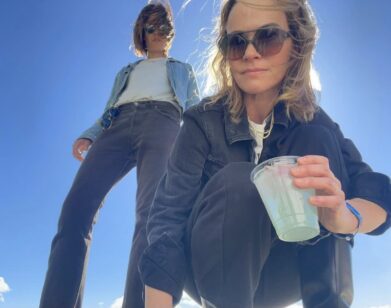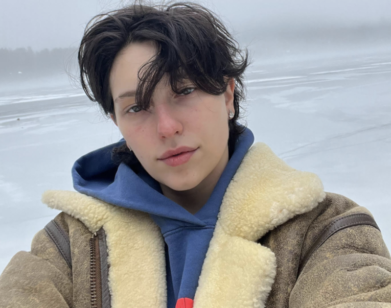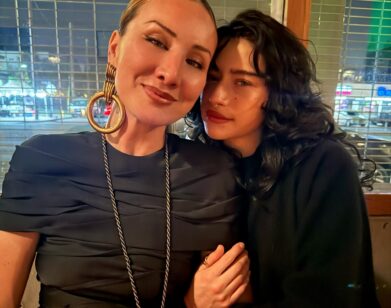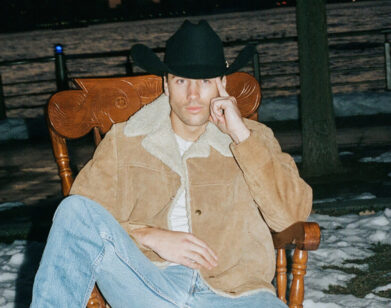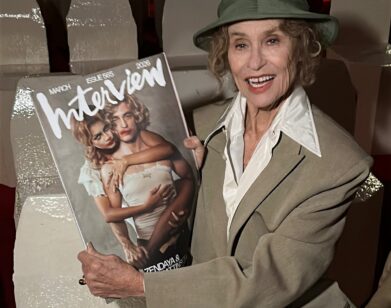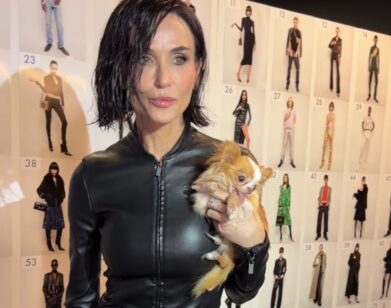IN CONVERSATION
Olivia Thirlby Tells iO Tillet Wright About Making TV for a Damaged World
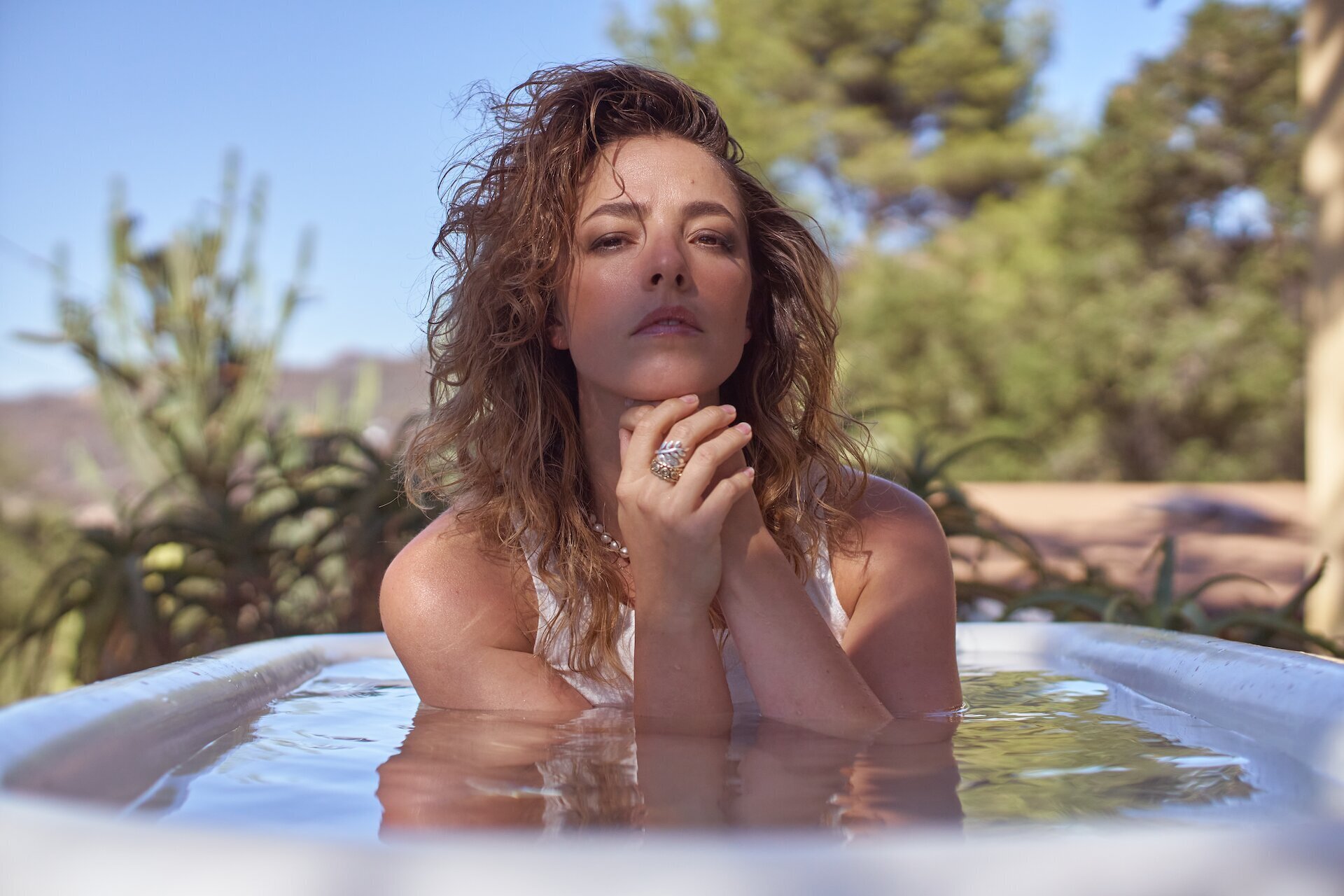
Photo by Lucas McGowen.
Imagine a world in which a mysterious virus wipes out half of mankind. Too easy? What if the only thing that its victims had in common was a Y chromosome? According to Olivia Thirlby, the star of FX on Hulu’s new series Y: The Last Man, the aftermath of such an event would be “a much more frankly integrated experience of sexuality.” The idea of rebalancing the scales of power in contexts of gender and sexuality is a powerful one to Thirlby, who came out as bisexual in 2011 and has since pursued projects that resonate with experiences in her own life. For the 35-year-old actor, Y was an appealing project for its depiction not only of a post-pandemic society, but also of a post-gender one. However, while the series indulges in the fantasy of eliminating the almost exclusively male executive branch, Thirlby cautions that Y is hardly the story of a “dinosaurs eat man, woman inherits the earth” scenario. Adapted from the early 2000s comic books of the same name, the series has been re-imagined to welcome more gender literate and gender fluid audiences. One major departure from the source material involves Hero Brown (Thirlby’s character)— an EMT-turned-dystopian-Amazonian-warrior and the daughter of the president—and her possible love interest, a trans man named Sam (Elliot Fletcher). As Thirlby’s fellow artist and activist iO Tillet Wright notes, Thirlby’s role in this on-screen romance makes the actor something of a queer, well, warrior. Here, the friends discuss the unifying power of TV in trying times, the long arc of trans representation in art, and how to bring LGBTQ+ issues to the wider world—that is, before it ends.
———
iO TILLET WRIGHT: Hi, friend.
OLIVIA THIRLBY: Hey, friend.
TILLETT WRIGHT: I’m so into this show, Liv. I’m blown away by the caliber of the cast.
THIRLBY: It’s been amazing being part of this ensemble because everyone’s just so rad. Everyone is so talented. It’s very humbling to be in that company, and also very nerve-wracking. But every person in the cast is a lovely person. They’re all sweet and kind and caring, and have no ego, and are deeply invested in art. Also, I feel like I have to talk about the other amazing people who made this show happen. Our costume designer, our directors, our DPs. We had almost all-female department heads. Almost all-female producers. It’s such an exciting thing.
TILLETT WRIGHT: And the writing is good, too.
THIRLBY: That’s Eliza [Clark, the show’s creator]. All roads lead back to Eli. She sets the tone for everything. She’s so kind, collaborative, supportive, and brilliant. She’s like, pathologically inclusive, and that is so rare.
TILLETT WRIGHT: The entire premise of the show is very tricky to take on in 2021. Early on—this isn’t a spoiler, it’s the premise of the show—when the president dies and every shitty Republican in drops dead, I was like, “Where is this place? I want to go.” It just seems like somewhere you’d actually want to be, versus the hellscape of our world right now. Why did you want to do this show?
THIRLBY: I remember the moment that I felt my body say yes to this project. On paper, it was a little bit intimidating. The content was so dark, and that gave me pause. I had to consider the implications because I care very much about what I put into the world. Darkness just for the sake of darkness is not something that I have any interest in participating in. But I had this Zoom conference with Eli, and I asked her what this story was about at its core. She said something along the lines of, “It’s about our held identities and what happens when we are forced to release them, and what happens when we’re forced to find out who we always were underneath.” That gave me full-body chills. I thought, “Well, shit.” It let me know there was a reason to be telling this story right now.
TILLETT WRIGHT: What do you feel like this show gets right, right now?
THIRLBY: Obviously, the implications of telling a story about a global pandemic in the midst of a global pandemic are huge. It’s important not to make content just for content’s sake. It’s important to know what you’re putting out into the world and why. For example, we had an entirely green production–all of the food was composted, there was no plastic. We tell stories to make sense of our own lives, but also to contribute to the world. It’s important that we figure out how to also not destroy the world while we’re doing that. I think this show contributes an honest look at people doing the best they can in unlivable, unthinkable circumstances. It shows people finding what healing is available to them. It shows the bond of relationship, the power of identity, and it lets us glimpse what happens to ourselves when those bonds are shifting. It’s interesting because I haven’t watched the whole show yet, so I feel like I’ll be able to answer that question really well by mid-November.
TILLETT WRIGHT: Get back to me at the Thanksgiving table.
THIRLBY: Was that my official invite to family Thanksgiving?
TILLETT WRIGHT: Yeah, but we’ll call it something else. Gratitude day.
THIRLBY: We don’t celebrate colonialism and genocide in this house.
TILLETT WRIGHT: What are the implications of TV, do you think, in a world that’s so dramatically damaged and complicated?
THIRLBY: I think there’s great potential for good and there’s great potential for harm. As a species, we’ve always relied on myths to make sense of ourselves. We’ve always relied on the power of story, from theater all the way into film, to go with us where we don’t want to go alone, to be a place of catharsis and healing. That’s still possible in the realm of television. But I also think that we are culturally addicted to fear, and it’s very easy to slip into a perpetuation of the fear, without providing a way through it. We’re undergoing such a radical shift as a collective. It’s important to pay attention to what narratives we’re telling ourselves and each other.
TILLETT WRIGHT: You and I met in 2010, and things have changed so drastically since then. When you and I met, there were really very few out female-identified actresses under the age of 30. Did you come out through my project [Self-Evident Truths, in which Wright took portraits of anyone who identified as on the LGBT+ spectrum]?
THIRLBY: Publicly, yeah. It’s mind-blowing to think back on the fact that that was actually a consideration that I had to make. I remember when you asked me to be photographed for Self Evident Truths, my first answer was, “Absolutely, thank you,” and my second answer was, “Wait, hang on a second.” It’s crazy to think that there were such big implications, because, boy, has the world changed in that regard. And it hasn’t been that long.
TILLETT WRIGHT: When you were photographed for Self Evident Truths in 2011, it was still big news for actors to come out as bisexual or as queer. You were already bold and unapologetic back then. But I think this show is a really queer-forward show. Elliot Fletcher, your co-star on Y: The Last Man, identifies as a trans person. And it seems like, from what I’ve seen so far, you’re going to end up in a queer relationship with Elliot’s character on this show. Yes? Maybe?
THIRLBY: No spoilers.
TILLETT WRIGHT: No spoilers. But it’s a really groundbreaking, incredible thing that there might be a romance between a cis leading actress and a trans person. I wonder if you can speak to that. Was that exciting for you?
THIRLBY: The notion of being attracted to someone and not factoring in whether they’re cis or trans or intersex is still somewhat foreign to a lot of people, but for a lot of others its not foreign at all. That’s the way I am, and that’s the way Hero, my character, is. She doesn’t think being attracted to a trans person makes her anything in particular. I think that speaks to this deep need we all have to be able to step outside of binaries and labels. Culturally, we’re so sexually repressed, and that refracts and magnifies into an obsession with people’s genitals. Where we’re heading, thank-fucking-God, is toward an understanding that not just sexual expression, but interpersonal attraction is about human beings. It’s really exciting to be playing a character who fully embraces that.
TILLETT WRIGHT: Speaking of sexuality, I feel like part of the journey of trans people, which I know you care deeply about, is about being seen as human beings, and not just being cast as, like, the crazy sex worker with AIDS, or whatever. Letting us be nuanced humans, and then also letting us be not fetishized people, but desirable people. People who cis people fall in love with. I can’t think of an example of a trans male or trans masculine person on not a specifically LGBT, whatever that category means, show that is the love interest of a leading actress. As far as I know, this show is really trailblazing.
THIRLBY: Yes. I also want to talk briefly about the title of the show, Y: The Last Man. What we’re trying to do is very intentionally uncouple chromosomes with gender, because chromosomes do not equal gender. That is the stance of the show. It’s the stance of every character in the show. Y: The Last Man refers to, in many ways, the chromosome Y. But it is important to mention that this show is based on source material that is 20 years old. 20 years is many lifetimes in the world of trans awareness, trans visibility, and gender diversity. Because in our show, when everyone with a Y chromosome dies, that includes a lot of women and it includes a lot of non-binary and intersex folks. So the show is about an event which doesn’t just kill all the men and leave all the women, it kills everyone in the population with a Y chromosome and everyone in the population without a Y chromosome survives. Those two groups can’t be broken into men and women, because gender and chromosomes are not the same thing. So that’s why in our show you see men and you see non-binary folks alongside women. Because Y: The Last “Cis” Man…
TILLETT WRIGHT: It doesn’t have quite the same ring to it. I find myself sometimes sad when I watch things through the lens of all my activism and awareness, because I can’t always just enjoy stuff. That being said, it’s clear your show is very considered and very careful. It’s thousands of miles ahead of most content of its kind. Can you tell me about the experience of working with FX and how they handled the sensitivity of all these issues?
THIRLBY: As a cast, we were given a lot of resources to help us understand the importance of some of these issues, and to help us know how to think about and navigate them. We had a couple of training sessions with GLAAD, which were so meaningful to me. I got a really solid understanding of the differences between biology, gender identity, and sexual orientation, and a deeper understanding of how to be an advocate in the world. It’s been really wonderful for me to be able to say to other people in my life, “This is how you should approach this topic or this question or this person.” To have the ability to explain in a way that isn’t making the other person wrong, but rather is educating them, has been such a privilege. Because the burden shouldn’t just fall on LGBTQ+ people to educate others. I do identify as being on the LGBTQ+ spectrum, but as someone whose gender identity matches up with what society would project on me, I have it a lot easier. I think that the burden really falls on people like me to help the community educate those that need to be educated.
TILLETT WRIGHT: One of the things that I think most people don’t know about you is that a few years ago you called me one day and you said, “I quit acting and I’m going to be a florist.” Then you called me and said that you were exploring being a death doula. You have a deep spirituality that runs through your life and I feel like when you’re not acting, you pour yourself into these other explorations of existence. This show weirdly taps into all of these things I’ve heard you express interest in: death, gender, sexuality, womanhood, power, what life is. It would have had to have been really meaningful to pull you out of being a florist.
THIRLBY: And a death midwife. I’m still exploring it. I’m still integrating all these pieces of myself. Something that this show actually did give me the opportunity to do was it allowed me to integrate who I am into the craft of acting. I hate even calling it a craft, because it sounds so pretentious. I don’t know how to be a craftsman when it comes to acting. I feel like I have to learn how to do it all over again every day. It’s like surfing on smoke, there’s nothing solid for you to cling to. Sometimes you catch the wave, but a lot of the times you just end up fumigating yourself. Wait, where was I going with this?
TILLETT WRIGHT: Talking about death.
THIRLBY: Death, yeah. What was I going to talk about before that though?
TILLETT WRIGHT: … Florist.
THIRLBY: Right. I think the biggest difference between the way I related to my career before quitting versus coming back is that the energetic dynamic between me and the world really shifted. I returned to asking what it was that I could offer, rather than what I could pull toward me. Since then, the projects that have come my way have been in deep alignment with the themes and topics that I am exploring in my own life. I did an arc on The L Word where I played a gay priest, which is extremely on-brand for me. Love me some Jesus. Then I got to do this, and what was so interesting about Hero is that, as I was saying earlier, there were a lot of things about her on paper which gave me pause. I didn’t think that I was that much like her, because I don’t consider myself angry or violent. But I think that the world that she finds herself in lends itself to a much more frankly integrated experience of sexuality. For a population to experience death on such a large, scale, so instantaneously, brings a deep immediacy to sex and sexual expression. Not to mention the fact, that our repression of sex is completely related to our repression of death and dying. They are in the same sphere of bodily experience, death, and sex. Especially for my character, because Hero is someone who is extremely sexual and expresses herself sexually in ways that are both very unhealthy and very healthy. I think that it’s going to be interesting to explore that. I am gratified that, for whatever reason, I seem to be bringing myself opportunities to explore topics that I already want to learn more about.
TILLETT WRIGHT: What are you excited about right now–as a person, as an actor, and as a woman? What do you feel is important at this moment?
THIRLBY: I’m excited to begin learning how to decolonize my brain. It’s a journey that I’m at the very, very beginning of. I feel like it’s the most important thing that I can be doing. I’m excited to learn how to participate in the world in ways that will help us all understand how, even though it feels like everything’s upside-down, maybe what’s happening is it’s all turning right-side-up. I don’t know. There are so many things I want to say, but I don’t necessarily want to say them.
TILLETT WRIGHT: Well, decolonize your mind is a fantastic answer.
THIRLBY: Cool.
TILLETT WRIGHT: I think you’re really cool.
THIRLBY: You lead the way, my friend. I just follow where you point.
Hair: Candice Birns
Makeup: Bethany McCarty

